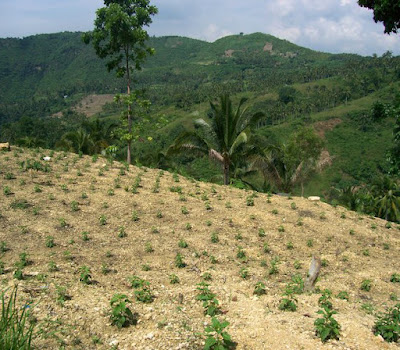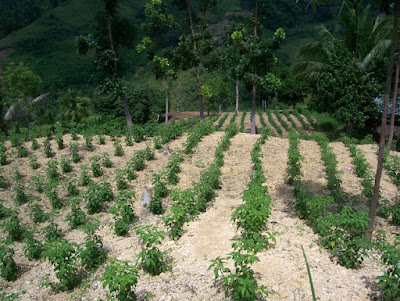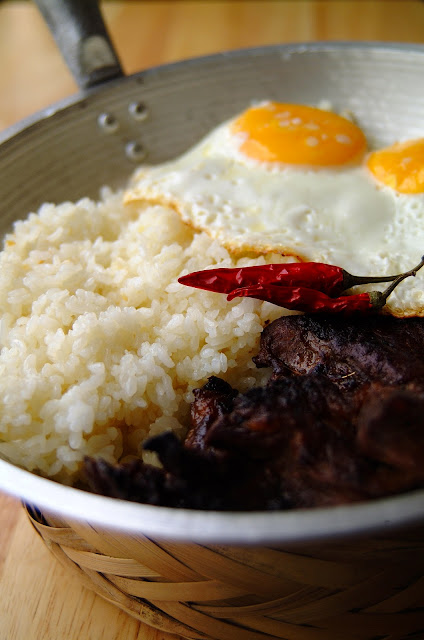International Food Exhibition Philippines - May 12-14, 2011
Saturday, January 15, 2011
Internation Food Exhibition-Manila, Philippines
International Food Exhibition Philippines - May 12-14, 2011
We're very excited to be one of the attendees of this International Food Exhibition in Manila,Philippines on May 12-14, 2011.
Saturday, January 8, 2011
Information on Philippine Bird'sEye Pepper (Tagalog-Siling Labuyo)
Bird's eye chili (Thai: พริกขี้หนู, RTGS: phrik khi nu, IPA: [pʰrík kʰîː nǔː], literal: mouse dropping chili; Tagalog: siling labuyo) is a chili pepper of the species Capsicum frutescens L. in the family Solanaceae, commonly found in Cambodia, Laos, Vietnam, Thailand, Malaysia, Indonesia, the Philippines and Singapore.
It can also be found in India, mainly Kerala, where it is used in traditional dishes of the Kerala cuisine (pronounced in Malayalam as kanthari mulagu). This species (known as kochchi in sinhalese) is also found in rural areas of Sri Lanka, where it is used as a substitute for green chillies. It is also a main ingredient in kochchi sambal, a salad made using freshly scraped coconut ground with thai chillies and seasoned with salt and lime juice.
The term Bird's eye chili is also used for the North American Chiltepin pepper, both due to their small round shape and because they're widely spread by birds.
The bird's eye chili plant is a perennial with small, tapering fruits, often 2-3, at a node. The fruits of most varieties are red, some are yellow, purple or black. The fruits are very pungent. The flowers are greenish white or yellowish white.
Taxonomically, it has long been thought that the bird's eye chili belongs to Capsicum frutescens L.,but there are now some who list the bird's eye chili as belonging to Capsicum chinense.
The bird's eye chili is small but packs quite a lot of heat. At one time it was even listed as the hottest chili in the Guinness Book of World Records but other hotter varieties of chili have since been identified. It measures around 50,000-100,000 Scoville units which is at the lower end of the range for the hotter Habanero chili.
Bird's eye Peppers
- Plant height - up to 2meters
- Stem color - Green
- Leaf color - Green
- Leaf size - 3–8 cm by 2–4 cm
- Fruit color at maturity - green, orange and red
- Fruit shape - conical
- Fruit length - 2–3 cm
- Fruit width at shoulder - .5 cm
- Fruit weight - 2-3 grams
- Fruit surface - smooth
- Seed color - Light tan
- Seeds per chili - 10-20
The fruit of the bird's eye chili is popularly used as a spice and as a chili condiment in Filipino, Indonesian, Laotian, Malaysian, Thai, and Vietnamese cuisine. It is what gives local dishes, such as the Filipino bicol express, their fiery zing.
The chilies can also be used to flavor vinegar.
The leaves are also edible and can be eaten as a vegetable, for instance in the Filipino dish tinola.
Philippine Chili Peppers (Tagalog-Siling Labuyo, Bicol-Sambalas)
Philippine Bird's Eye Pepper
We are busy, busy working on a lot of research and certifications for the approval of the importation of this Philippine Bird's Eye Pepper from the Philippines. In the meantime, we want to share with you some photos that we have research on this naturally grown Philippine Bird's Eye Pepper. This will give you some ideas how they are grown and shipped and then to your everyday dishes.
We will be updating and posting more information and photos as we go along our progress in our approval by the US Department of Agriculture & US Food & Drug Administration.
Photos of the farm courtesy of R. Tequillo
We are busy, busy working on a lot of research and certifications for the approval of the importation of this Philippine Bird's Eye Pepper from the Philippines. In the meantime, we want to share with you some photos that we have research on this naturally grown Philippine Bird's Eye Pepper. This will give you some ideas how they are grown and shipped and then to your everyday dishes.
We will be updating and posting more information and photos as we go along our progress in our approval by the US Department of Agriculture & US Food & Drug Administration.
Photos of the farm courtesy of R. Tequillo
Tuesday, January 4, 2011
Pili Nut - Dried without shell
Dried and Shelled Pili Nuts
Its been ages that I have not been to Bicol region where this type of nut grows abundantly but I can vividly remember how this Pili Nuts taste and look like. I tell you, they are much better than macadamia nuts and pine nuts. Although, we have seen some Pili Nut in some Asian stores, they are mainly sugar or caramel coated. We are really looking forward to introduce our Pili Nuts to the US, Canada & Qatar market.
We'll keep you posted. We will also be featuring more information of our products, its uses, recipes and much more, so please stay tuned with us!
Labels:
Bicol,
Filipino food,
Nuts and Grains,
Philippines,
Pili Nut
Monday, January 3, 2011
Philippine Chili Peppers (Tagalog-Siling Labuyo, Bicol-Sambalas)
One of our main products to import and sell here in the US, Canada & Qatar is this DRIED PHILIPPINE CHILI PEPPERS (Tagalog term-Siling Labuyo, Bicol term-Sambalas)
This type of pepper is so small but considered as one of the spiciest compared to the other mexican chilis available locally here in the US.
While we gather more information that we can share with you about this product of ours, we would like you to enjoy these photos of a typical Filipino breakfast that includes this pepper.
This type of pepper is so small but considered as one of the spiciest compared to the other mexican chilis available locally here in the US.
While we gather more information that we can share with you about this product of ours, we would like you to enjoy these photos of a typical Filipino breakfast that includes this pepper.
Photos courtesy of 80 Breakfasts
Sunday, January 2, 2011
MANUEL ALA-Director, Sales & Business Development for State of Qatar
Manuel Ala
Director, Sales & Business Development
State of Qatar
Manuel Ala joined The Nature’s Market in December 2010, and contributes over 12 years of international trading and marketing devoted to Middle Eastern countries such as Kingdom of Saudi Arabia (KSA) and State of Qatar.
He is a specialist in the areas of international trading & distribution of agricultural products from all over the world to Qatar. He also brings his extensive management & financial skills from his work experience in the banking industry.
Manuel oversees The Nature’s Market Sales, Marketing and Merchandising department and is responsible for developing the company products recognition in Qatar. Manuel holds a bachelor’s degree in Business Administration major in Marketing & Management.
Manuel is also an active leader in various social organizations. He has been the President of PIBQ (Pag-Iribang Bicolnon Qatar) a non-profit organization that helps and support various projects in the Philippines for the sake of alleviating poverty.
An avid fan of sports, he is also active in basketball tournaments in Qatar.
Manuel is also an active leader in various social organizations. He has been the President of PIBQ (Pag-Iribang Bicolnon Qatar) a non-profit organization that helps and support various projects in the Philippines for the sake of alleviating poverty.
An avid fan of sports, he is also active in basketball tournaments in Qatar.
Our Top 4 Products
Happy New Year everyone!
Importing and Exporting food products to the US is quite tedious. There are so many procedures and strict rules to follow to be able to have food product be available to our customers.
Here's a list of our initial Top 4 products that we are working on to be available in the US and Qatar market:
#1 PILI NUT - Dried Plain or Dried Salted
#2 PHILIPPINE CHILI PEPPERS - Dried
#3 GABI LEAVES (TARO) - Dried
#4 PHILIPPINE MANGOES - Dried chips
Importing and Exporting food products to the US is quite tedious. There are so many procedures and strict rules to follow to be able to have food product be available to our customers.
Here's a list of our initial Top 4 products that we are working on to be available in the US and Qatar market:
#1 PILI NUT - Dried Plain or Dried Salted
#2 PHILIPPINE CHILI PEPPERS - Dried
#3 GABI LEAVES (TARO) - Dried
#4 PHILIPPINE MANGOES - Dried chips
Subscribe to:
Posts (Atom)

















 Ph
Ph




